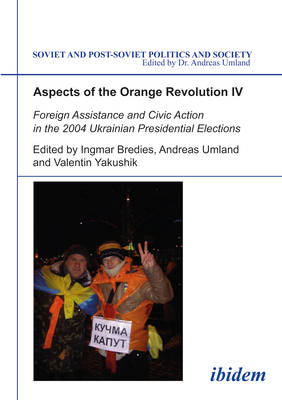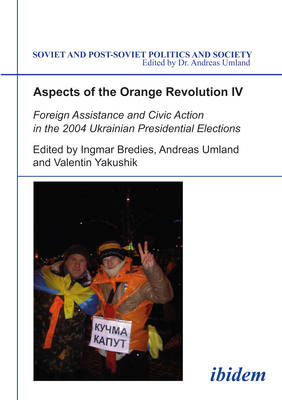
Bedankt voor het vertrouwen het afgelopen jaar! Om jou te bedanken bieden we GRATIS verzending (in België) aan op alles gedurende de hele maand januari.
- Afhalen na 1 uur in een winkel met voorraad
- In januari gratis thuislevering in België
- Ruim aanbod met 7 miljoen producten
Bedankt voor het vertrouwen het afgelopen jaar! Om jou te bedanken bieden we GRATIS verzending (in België) aan op alles gedurende de hele maand januari.
- Afhalen na 1 uur in een winkel met voorraad
- In januari gratis thuislevering in België
- Ruim aanbod met 7 miljoen producten
Zoeken
Aspects of the Orange Revolution IV
Foreign Assistance and Civic Action in the 2004 Ukrainian Presidential Elections
Andreas Umland, Ingmar Bredies, Valentin Yakushik
€ 37,45
+ 74 punten
Omschrijving
The fourth volume of "Aspects of the Orange Revolution" continues the previous volume's discussion on the impact of foreign actors on Ukrainian politics. It provides both scholarly analyses and first-hand accounts. The collection not only investigates, but also gives voice to, some of those involved in the events of 2004. While most of the volume's contributors have an academic background, some of them report here from the perspective of official election or informal participant observers of the three rounds of the Ukrainian presidential elections. Part One juxtaposes some contrasting views on how far Russia's and the West's various interests, activities and tools influencing the Orange Revolution were comparable to each other, and adequate given the circumstances. Part Two presents individual reports by a number of international election observers who were following the campaign and voting in various parts of Ukraine in 2004. Part Three presents three additional on-the-ground observations focusing solely on the notorious electoral district No. 100 of Kirovohrad Oblast. The contributions by Andreas Umland, Iris Kempe, Iryna Solonenko, Vladimir Frolov, Valentin Yakushik, Matthias Brucker, Jake Rudnitsky, Rory Finnin, Adriana Helbig, Paul Terdal, Tatiana Terdal, Peter Wittschorek, Hans-Jörg Schmedes, Adrianna Melnyk, Ingmar Bredies, Oxana Shevel, and Volodymyr Bilyk add a number of novel points of view to those presented in the previous volumes. These partly contradictory and emotional texts as well as a number of photographs document the tense atmosphere and confrontational climate within which Ukraine's second phase of post-Soviet democratization started in 2004.
Specificaties
Betrokkenen
- Auteur(s):
- Uitgeverij:
Inhoud
- Aantal bladzijden:
- 244
- Taal:
- Engels
- Reeks:
- Reeksnummer:
- nr. 66
Eigenschappen
- Productcode (EAN):
- 9783898218085
- Verschijningsdatum:
- 22/11/2007
- Uitvoering:
- Paperback
- Formaat:
- Trade paperback (VS)
- Afmetingen:
- 148 mm x 210 mm
- Gewicht:
- 294 g

Alleen bij Standaard Boekhandel
+ 74 punten op je klantenkaart van Standaard Boekhandel
Beoordelingen
We publiceren alleen reviews die voldoen aan de voorwaarden voor reviews. Bekijk onze voorwaarden voor reviews.









